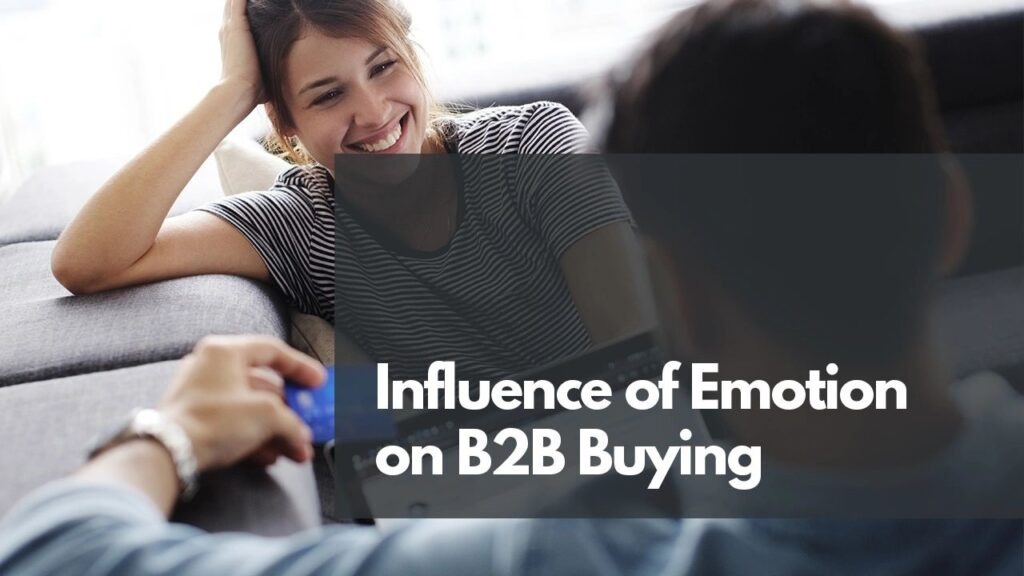When you think of emotion and buying, what comes to mind? Impulse-buying? Parking your brain in the garage when you pull out your pocketbook? Making purchases based on the way you’re feeling on a particular day?
None of that seems very smart, or business-savvy.
What if I told you there is a difference between emotion and feeling emotional?
Emotion can exert a strong influence on a buyer without breaking the surface. Emotions like trust, confidence, concern and suspicion are all emotional responses – they are just less consciously emotional responses than tears, laughter or hair-raising fear. However, they are no less influential when it comes to B2B marketing.
Check out this comparison sheet on The Influence of Emotion on B2B Buying.
Here’s the big question: could emotion trump business value as a B2B differentiator?
At the end of the day, B2B purchase decisions are made by human beings who see the impact of those decisions in personal terms – not just professional ones. They care about the outcome for their business – but they care even more intensely about what that outcome means for them as an individual. It’s emotional factors such as trust, confidence and reassurance that are the most powerful differentiators for B2B brands.
Focus on Sentimental Value
Most B2B marketing focuses on the value that a solution provides to the business – but a breakthrough study shows that B2B buyers actually struggle to differentiate between potential suppliers on this basis. They assume that they all have roughly equivalent value to add. The real differentiator is the emotional benefit they personally feel from making a particular choice.
In fact, doubling the sentimental value of your B2B marketing strategy has twice as much of an impact as the enterprise value has.
B2B purchasers are almost 50% more likely to buy a product when they see personal value for them in the form of confidence in their choice – or a positive impact on their career. They’re also 8x more likely to pay a premium for that product.
Again–trust, confidence, and reassurance make all the difference.
B2B Buyers Care About the Future
Appealing to a potential buyer’s desire to increase the bottom line or offering solutions to a pain point are all well and good– but research shows that a major motivation for potential B2B buyers is looking ahead. It turns out that when it comes to purchasing, our aspiration to secure the future we want and the confidence that we’re capable of doing so becomes a powerful force that influences buying decisions.
Personal Connection and Risk Assessment
Less than half of potential clients believe that B2B companies have a subjective value–the numbers speak for themselves. Over 70% of buyers that detect a product’s sentimental value are likely to purchase the item.
B2B buyers care more about emotional connection and sentimental value than they do about bare numbers and subjective offerings. In fact, on average, B2B customers are significantly more emotionally connected to their vendors and service providers than consumers.
This high level of connection with B2B customers makes a lot of sense when you consider the risk factor involved. When a B2C consumer makes a bad purchase, the stakes are relatively low. Best case, it’s returnable. If not, it might require an explanation to a spouse or a small financial speedbump. Business purchases, on the other hand, can involve huge amounts of risk: as you can imagine, taking responsibility for a multi-million dollar software acquisition that goes bad can lead to poor business performance and even the loss of a job. The business customer won’t buy unless there is a substantial emotional connection to help overcome this risk.
Get Personal
Bottom line? B2B marketers should put more emphasis on emotive brand-building. The role of emotion in B2B buying can’t be minimized – and confidence, optimism, and the potential to trust your business as a supplier-partner are the most influential forms of emotional capital for B2B brands to invest in. Now’s a great time to do so.
By getting personal, B2B marketers can get ahead — creating purchase intent, pricing power, brand advocacy and, most importantly, happy customers.
Interested in getting personal and shifting your B2B marketing over to a more emotive style of branding? Megan Killion Consulting is a team of experienced, professional experts who can work over your marketing and branding to gain valuable sentimental value. Contact us today so we can discuss your business needs and how we can increase your sales with winning strategies.

